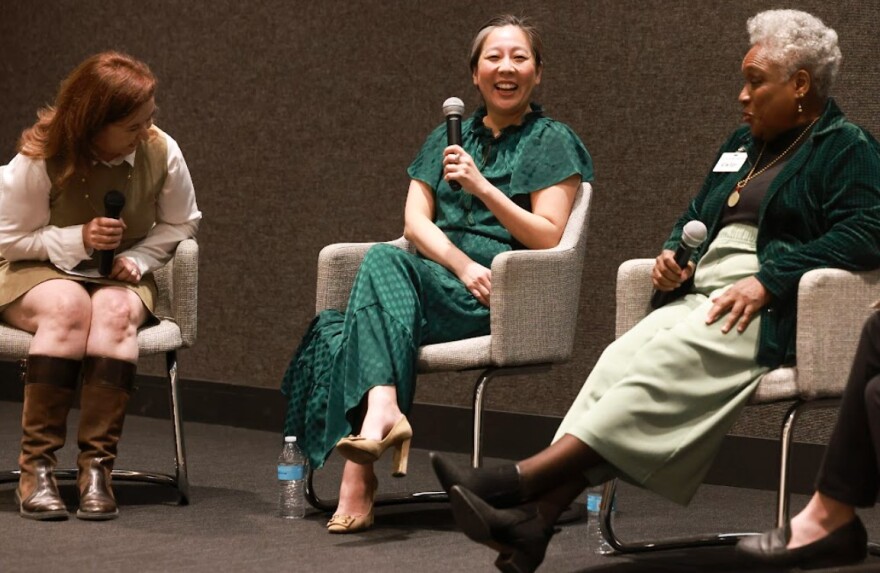Explore more stories from Arts Access.
Elizabeth Myong, a reporter who is part of the Arts Access partnership, opened the public discussion she moderated Wednesday at The Dallas Morning News by asking about the panelists' experience with 'workplace wellness' — whether they regretted not getting more help or guidance in handling the pressures of work and management
Kathleen Culebro, artistic director of Amphibian Stage in Fort Worth, replied by joking she didn't understand the concept of work-life balance. When she's not working, she doesn't know what to do with herself. So being tasked to work too hard, too long, wasn't really an issue.
Instead, Culebro said, "being treated with respect contributes hugely to my mental well-being."
She explained: "Too often our board members assume that artists need to be told how to do things in the real world, how to run a business. And we're actually quite intelligent human beings."
In fact, Culebro described the lack of respect as "soul-killing."
Much of the spirited discussion that followed circled around defining "respect."
Vicki Meek — the former, longtime director of the South Dallas Cultural Center who is an independent curator-critic-artist — argued that some women of color have been appointed to management positions to "check off the boxes" of gender and race. That single hire makes the institution look good, despite any real, larger problems it might have with staffing or audience diversity.
In short, the woman is appointed as a public relations gesture. She was never appointed to make real changes, despite whatever she might have been told or what the public was sold.
"And that is one of the strategies for getting rid of somebody," Meek said.
If a newly appointed male director cleans house, she noted, that's seen as his prerogative, picking the people needed to fulfill the board's agreed-upon goals.
"That's great, he's powerful, he's got it," said Meek. But when a woman of color does this, she's viewed as a troublemaker: "If you don't let the person come in and build the team that they need to do the work, then you are slating them for failure."
Caroline Kim, director of development for the Crow Museum of Asian Art, said that the support that's needed is more than staffing, resources and professional respect. It's time — being given enough "runway" to meet the goals that have been set by the board and its new director.
Myong asked about such organizational goals and measurements — what she called "the traditional metrics of success" — and whether that model needed to be challenged by female leaders.
"I don't think it's an either-or," said Meek, "because the implication is that if you bring in a leader of color, then all of a sudden you're not going to have any money. I think that's a myth because we've had plenty of leaders of color come in and turn the whole thing around and make money. I think what we have to do is to look at what are the reasons that the organization is thinking that they need a change, a cultural change — to broaden who they are."
Such pressures and problems over respect, support and expectations for female leaders in the for-profit business world have led to what's been dubbed "The Great Breakup." More women may be in positions of power — and more women are abandoning them in frustration.

But the panel also addressed four methods for countering these forces. First, increased mentoring by women of color who have weathered the winds of managing in the non-profit arts worlds. Lily Weiss, executive director of Dallas Arts District (and former head of dance at Booker T. Washington High School), was in the audience and volunteered to help mentor people — and was flocked when the panel discussion was over.
Second was education — increased arts education and increased support for arts groups to physically bring in students into their own venues rather than cheaping out and simply sending an actor or artist to a couple of school classrooms. This can bring in more funding to an arts group (if city funding is set up that way), but it also helps 'de-mystify' attending the arts, being an artist, even running an arts organization.
The third was female leaders learning to speak up and object when they see what's happening to them — something Culebro admitted that, as a woman born in Mexico City, she found particularly difficult.
But, Meek said, many people don't know something's wrong until somebody tells them it is. She finds it actually "hurtful" not to speak up when she sees something she objects to.
And finally, voting.
Meek said, "Dallas is the least political town I know" when it comes to people being engaged at the local level to make change happen. Dallas has a new cultural plan, a plan that directs more money and city services to smaller, Black and Latino groups.
"The plan's good," Meek said. But no matter how good a cultural plan is, it means nothing "unless you hold the politicians to it."
Arts Access is a partnership between The Dallas Morning News and KERA that expands local arts, music and culture coverage through the lens of access and equity.
This community-funded journalism initiative is funded by the Better Together Fund, Carol & Don Glendenning, City of Dallas OAC, Communities Foundation of Texas, The Dallas Foundation, Eugene McDermott Foundation, James & Gayle Halperin Foundation, Jennifer & Peter Altabef and The Meadows Foundation. The News and KERA retain full editorial control of Arts Access’ journalism.
Got a tip? Email Jerome Weeks at jweeks@kera.org. You can follow him on Twitter @dazeandweex.
Art&Seek is made possible through the generosity of our members. If you find this reporting valuable, consider making a tax-deductible gift today. Thank you.



